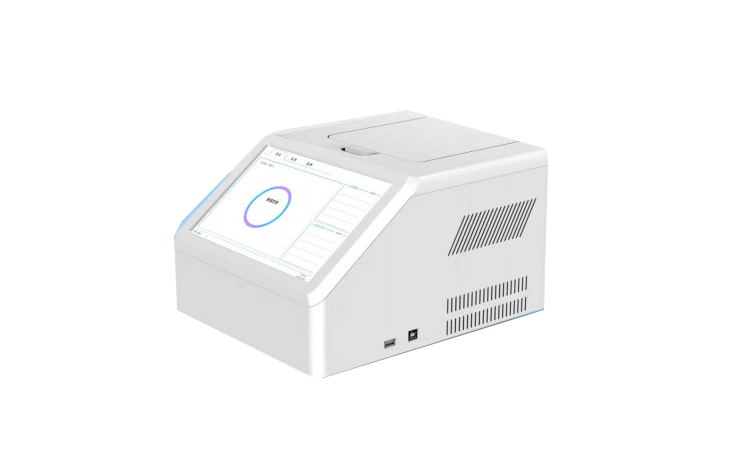WhatsApp:
+86 18866361895
WhatsApp:
+86 18866361895


型号:YT-P32
1、 Product Overview:The real-time fluorescence quantitative PCR system is mainly used to run real-time fluorescence quantitative PCR experiments. Through fluorescence excitation a···
WhatsApp:+86 18866361895(Manager Xu)
WeChat:+86 17865361250(Manager Xu)
Email:yuntang@foxmail.com
Technical Parameter
Picture Introduction
1、 Product Overview:
The real-time fluorescence quantitative PCR system is mainly used to run real-time fluorescence quantitative PCR experiments. Through fluorescence excitation and collection, the experimental process is monitored in real time. The experimental process data is plotted as a fluorescence curve and presented in real-time on the instrument display interface. The experimental data is fitted and analyzed, and finally a PDF format experimental report can be generated.
Rapid and accurate qualitative and quantitative analysis of target nucleic acids contained in biological samples (such as blood, body fluids, etc.) taken from other animals, as well as standard curve, melting curve, genotyping and other analyses of special samples.
2、 Basic principles
The principle of real-time fluorescence quantitative PCR instrument: Polymerase chain reaction (PCR) is a molecular biology technique used to amplify and amplify specific DNA fragments. It can be regarded as a special DNA amplification in vitro, consisting of several steps such as high-temperature denaturation, low-temperature annealing, and appropriate temperature extension to form a temperature cycle, allowing the target gene to be rapidly amplified. It has the characteristics of strong specificity, high sensitivity, easy operation, and time-saving, and is a major innovation in gene amplification technology. PCR technology can amplify extremely small amounts of target DNA by millions of times, greatly improving the analysis and detection capabilities of DNA molecules.
Real time fluorescence quantitative PCR technology is a method that adds corresponding fluorescent dyes or fluorescent labeled probes on the basis of conventional PCR, and detects the entire PCR process in real time through changes in fluorescence signals during the PCR reaction process. The method uses fluorescent chemicals to monitor the total amount of products after each polymerase chain reaction (PCR) cycle, and quantitatively analyzes specific DNA sequences in the test sample through internal or external reference methods.
3、 Basic structure of the instrument
The real-time fluorescence quantitative PCR system is an instrument for real-time detection of reactions, mainly composed of a gene amplification thermal cycle system, a fluorescence real-time detection system, a microcircuit control system, a computer, and application software. Two core functional modules are: thermal cycling system and real-time fluorescence detection system. The working principle of the gene amplification thermal cycle system is basically the same as that of traditional gene amplification instruments, using semiconductor heating and cooling to complete the thermal cycle process. The fluorescence detection system mainly consists of fluorescence excitation components, optical signal transmission components, fluorescence detection components, and control systems.
4、 Application Fields
□ Basic scientific research
□ Pathogen detection
□ Animal epidemic detection
□ Meat products adulterated
□ Transgenic testing
□ Food hygiene quarantine
□ Drug development and rational drug use
□ Gene expression
□ Water monitoring
Product Name: P16 P32 P48
appearance
Dimensions: 235mm * 385mm * 175mm (width * depth * height)
Weight 5.6kg 5.7kg 5.8kg
Electrical parameters~220V/50Hz, 255W
Data interface USB 2.0 * 2 (two on the right)
Environmental parameters
Operating conditions: Temperature: 10-30 ℃, Humidity: 20%~80%
Transportation and storage conditions: Temperature: -20~55 ℃, humidity: 20%~80%
Altitude<2500 meters
Noise level A weighted,<60dB
Sample parameters
Sample size 16 * 0.2mL 32 * 0.2mL 48 * 0.2mL
Test tube type: single tube, eight row test tube
Sample volume 15-100uL
Temperature
Heating/Cooling Method: Semiconductor Heating/Cooling
Temperature range 4 ℃ -99 ℃
Maximum heating rate ≥ 3.5 ℃/s
Average heating rate ≥ 2.5 ℃/s
Maximum cooling rate ≥ 3.5 ℃/s
Average cooling rate ≥ 2.5 ℃/s
Temperature control accuracy ≤± 0.01 ℃
Temperature accuracy ≤± 0.1 ℃
Temperature uniformity ≤± 0.3 ℃
optical characteristics
Number of fluorescence detection channels 2 channels 4 channels 4 channels
High brightness LED light-emitting device
High sensitivity and high signal-to-noise ratio photodiodes for lighting devices
Adapt probe or dye first channel: 470/520 FAM, SYBR Green
Second channel: 530/570 HEX, JOE, VIC
Third channel: 580/610 ROX, CY3.5, Texas Red
Fourth channel: 630/670 CY5
Sensitivity detection: 1 copy
Linear detection range of 100-1010 copies
Linear correlation coefficient ≥ 0.999
Channel cross-talk, no crosstalk
Detection repeatability ≤ 1.0%